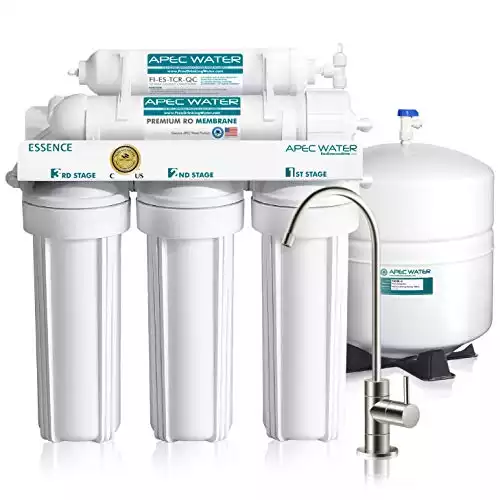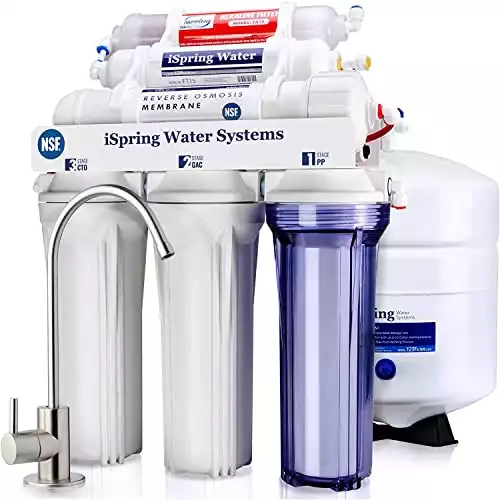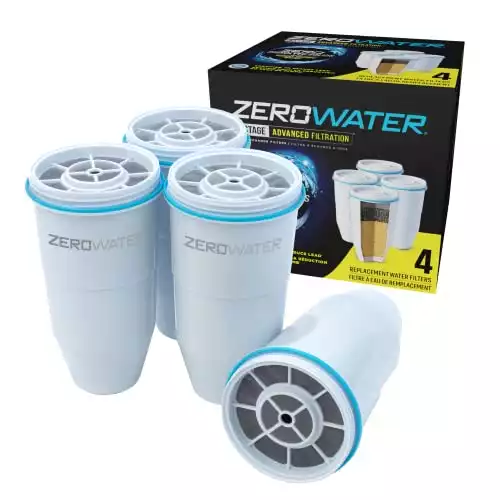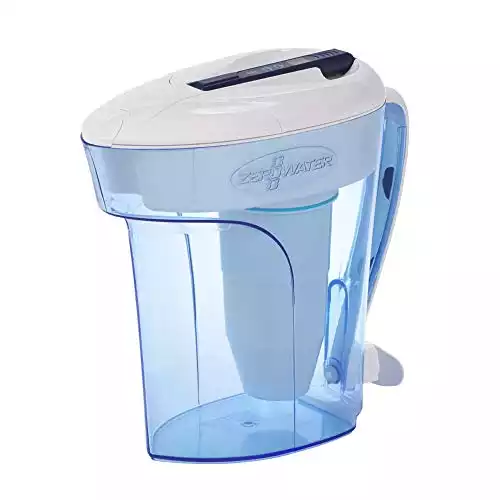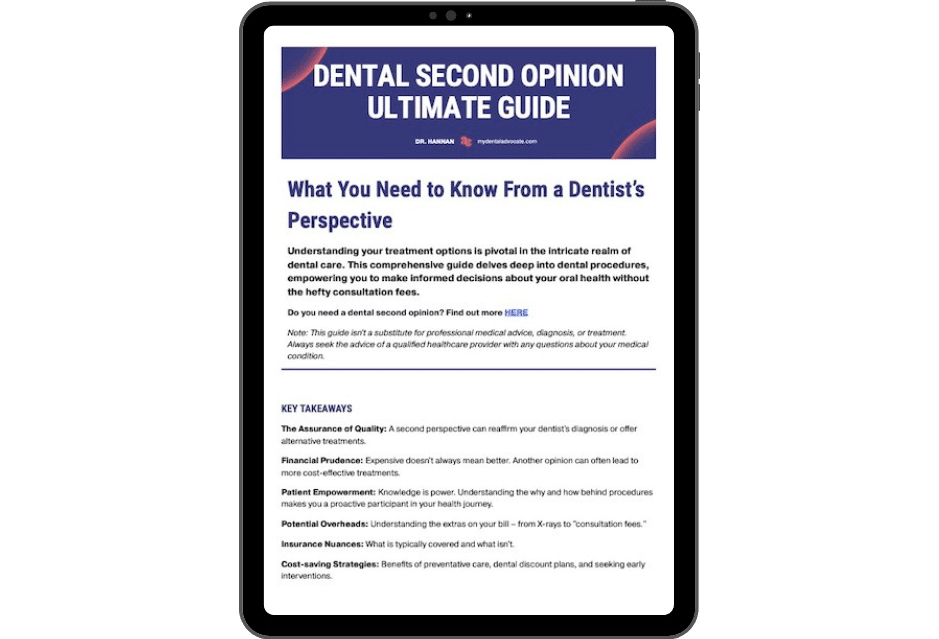Do Pur Filters Remove Fluoride? (2024 Update)
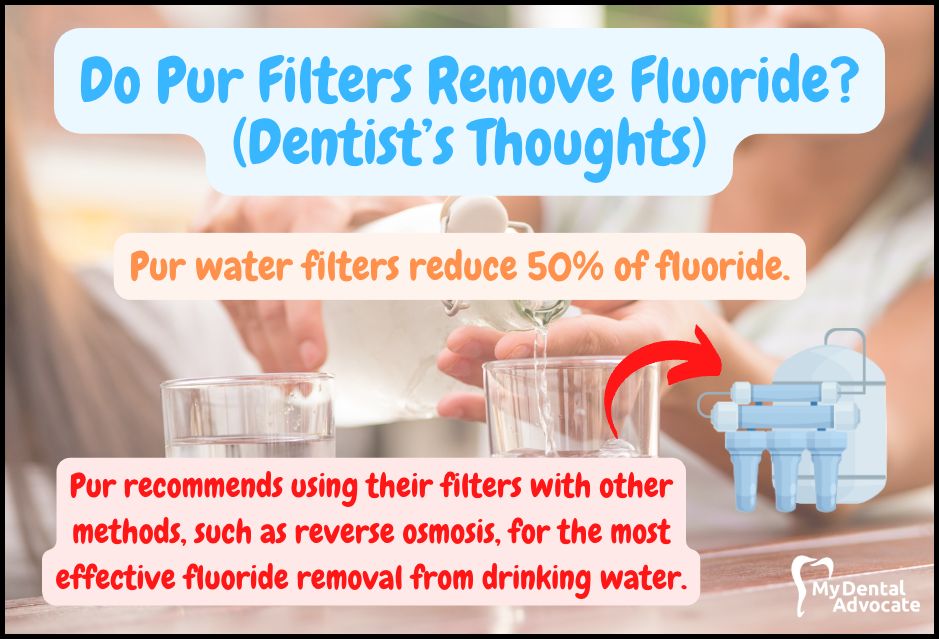
Access to clean and safe drinking water is necessary for human survival, yet many communities worldwide struggle with water contamination.
For example, fluoride, a naturally occurring chemical, is often added to drinking water to improve oral health.
But in excessive amounts, it can be harmful to our health and well-being.
We’ll explore the science behind Pur filters, their effectiveness in removing fluoride, and whether they are a reliable solution for providing clean and safe drinking water from a dentist’s perspective.
Need Dental Advice? Ask Dr. Hannan!
Does Pur Remove Fluoride from Drinking Water?
According to an at-home review by “Truth About Fluoride,” Pur water filters reduce 50% of fluoride. Pur recommends using their filters with other methods, such as reverse osmosis, for the most effective fluoride removal from drinking water.
Recommended Reading: Does Filtering Water Remove Fluoride? (2024 Update)Introduction to Pur Water Filters
By providing high-quality, convenient, affordable, and environmentally friendly water filtration products, Pur has become one of the most trusted and popular water filter brands globally.
Brief History of Pur
Pur is a brand of water filtration systems founded in 1986 by 24-year-old Harvard graduate Brian Sullivan. The brand was created to provide people with clean and safe drinking water worldwide.
Over the years, Pur has become one of the most popular water filter brands globally, with a wide range of products designed to meet different needs and preferences.
In 1989, William Butler survived 66 days at sea with the PUR Survivor 35 – the first hand-operated Desalinator.
How Pur Became a Popular Water Filter Brand
Pur’s success can be attributed to its commitment to providing high-quality water filtration products that are both affordable and effective.
In addition, the brand has invested heavily in research and development to develop innovative water filtration technologies capable of removing a wide range of contaminants from tap water.
Pur has also successfully created a strong brand image through its marketing efforts, which has helped increase awareness and loyalty among its customers.
In 1994, PUR invented the first faucet filtration system with Automatic Safety Monitor (ASM) gauge that lets consumers know when the filter is finished and can no longer remove contaminants.
Overview of Pur Filter Technology
Pur filters use a multi-stage filtration process that removes contaminants from tap water.
The filters use mechanical and chemical filtration methods to remove particles, pollutants, and impurities from water. Some key technologies used in Pur filters include activated carbon, ion exchange resins, and mechanical filters.
The filters are designed to provide safe and clean drinking water while maintaining the natural mineral balance of the water.
The PUR faucet filter removes 70 contaminants!
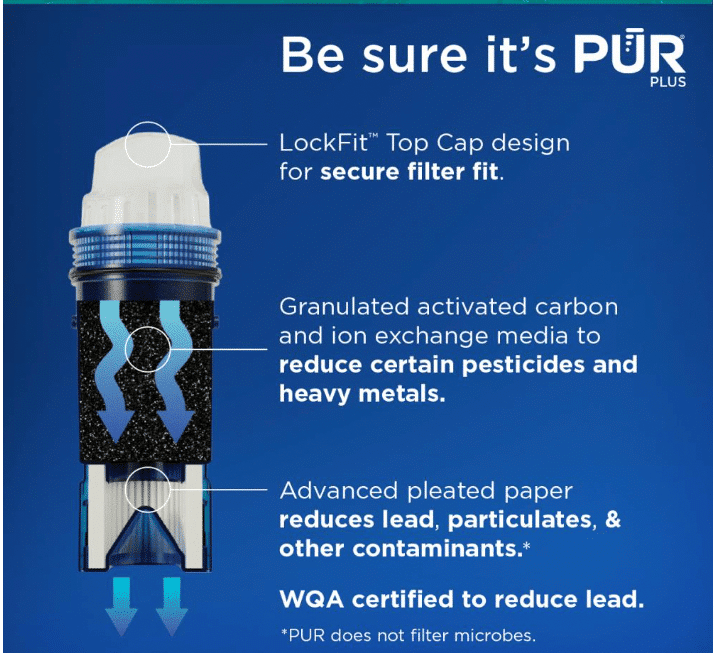
Product Range
Pur offers a wide range of water filtration products, including pitchers, faucet-mounted and dispensers.
The brand also offers filters specifically designed for travelers, such as portable water bottles and travel-sized filtration systems.
This range of products ensures a Pur filter is suitable for everyone, regardless of their needs or location. Shop their line of products on their website.
Product Line
- Faucet systems
- Pitchers
- Dispensers
- Replacement filters
Quality Standards
Pur filters are rigorously tested and certified by independent organizations, such as NSF International, to ensure that they meet the highest quality and safety standards.
In addition, Pur’s filters are also designed to be easy to install, maintain, and replace, making them a convenient and cost-effective solution for clean and safe drinking water.
Sustainability
Pur is also committed to being an environmentally friendly brand and takes steps to reduce its environmental impact through sustainable practices.
For example, the brand uses recyclable materials in its packaging, and its filters are designed to last for several months, reducing the need for frequent replacements. In addition, Pur has programs to help customers recycle their used filters, further reducing the brand’s environmental impact.
Recommended Reading: Do ZeroWater Filters Remove Fluoride? (2024 Update)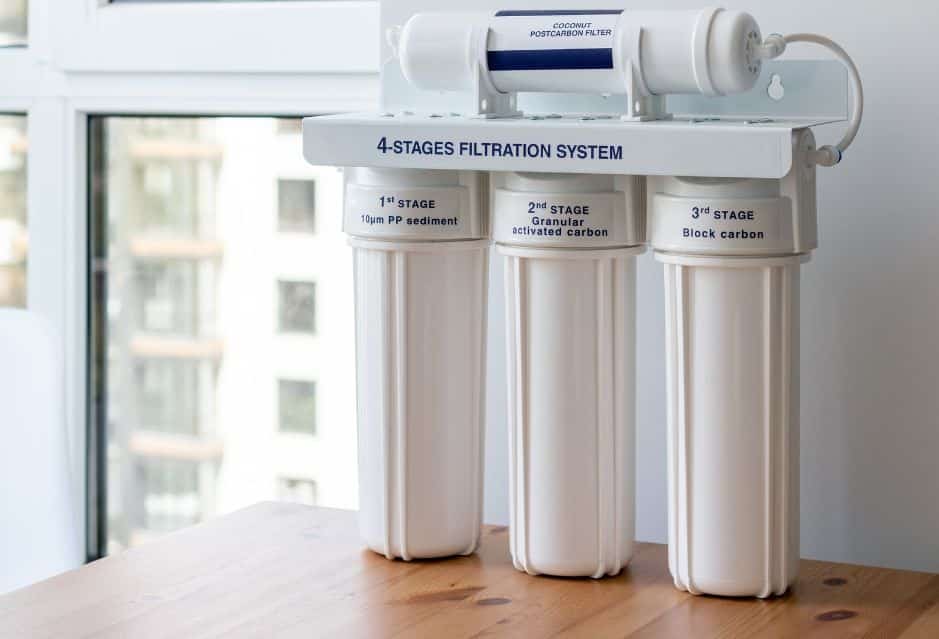
What is Fluoride and its Importance in Drinking Water
Fluoride is a naturally occurring chemical in water, soil, and some foods. Fluoride is well-known for its ability to strengthen teeth and prevent tooth decay, which is why it is often added to drinking water in small amounts.
Fluoride is considered an essential nutrient for dental health, and its presence in drinking water can help prevent tooth decay and improve oral health.
The World Health Organization recommends drinking water containing a fluoride concentration of 0.5-1.5 mg/L, as this is effective in preventing dental cavities and being safe for consumption.
Key Benefits
- Fluoride helps to strengthen teeth and prevent tooth decay.
- Fluoride in drinking water has been shown to reduce the incidence of dental cavities and improve oral health.
- Fluoride has a positive impact on overall health.
- Reduces risk of bone fractures (according to research)
Key Concerns
- Too much fluoride in drinking water can be harmful and cause fluorosis.
- Fluorosis can lead to discoloration and damage to the teeth.
- Possible Reduced IQ in children?
- Possible Bone fractures?
- PossibleThyroid problems?
- The World Health Organization currently considers fluoride safe for consumption in recommended concentrations.
The Science Behind Fluoride Removal Process
The process of removing fluoride from drinking water involves the use of a filtration system that is specifically designed to remove fluoride. This can be accomplished through various methods, including reverse osmosis, activated alumina, and ion exchange.
Recommended Reading: Fluoride Varnish vs. Fluoride Treatment (What’s the difference?)Comparison of Fluoride Removal Methods
- Reverse Osmosis: This method pushes water through a special membrane under high pressure. It’s great at filtering out contaminants, including fluoride, making it one of the best ways to remove fluoride from water.
- Activated Alumina: This filter media is designed to take fluoride out of drinking water. It works by capturing fluoride ions on its surface, effectively removing them from the water.
- Ion Exchange: This process swaps ions in water with ions in a resin bed. For fluoride, it replaces fluoride ions with hydroxide ions, successfully removing fluoride from the water.
Best Fluoride Removal Products
Premium long-lasting filters remove up to 99% of contaminants such as chlorine, taste, odor, VOCs, as well as toxic fluoride, arsenic, lead, nitrates, heavy metals and 1000+ contaminants. Max Total Dissolved Solids - 2000 ppm.
America's No.1 rated water filter brand with 20 years of success guaranteeing trouble free, noise-free system for long-lasting, dependable, pure drinking water. 2-year extended manufacturer warranty is available upon registration
Exclusively designed to restore the natural alkalinity and mineral balance of water, this reliable and ultra-safe Reverse Osmosis (RO) water filtration system converts your water into clean, pure and healthy drinking water by removing up to 99% of over 1,000 harmful contaminants like chlorine, fluoride, lead (removes up to 98%), arsenic, asbestos, calcium, sodium and more.
The iSpring RCC7AK Reverse Osmosis water filter includes an additional 6th stage - an Alkaline Remineralization filter that restores healthy minerals and produces a balanced alkalinity, which gives your water a more natural taste than regular 5-stage RO water filter.
ZeroWater filters are the only pour-through filters NSF Certified to remove chromium & lead. Their pitchers, tumblers, & dispensers remove virtually all solids for the purest tasting water.
Frequently Asked Questions (FAQ)
Do I need to filter fluoride?
Whether you need to filter fluoride from your drinking water depends on several factors, such as the source of your water, the concentration of fluoride in your water, and your personal preferences. If your water source contains high levels of fluoride, filtering it may be necessary to avoid potential health risks associated with excessive fluoride intake. Some people may also choose to filter fluoride for personal or philosophical reasons. There are several types of water filters available, including activated carbon filters, reverse osmosis filters, and ion exchange filters, which can effectively remove fluoride from drinking water.
Is Brita better than Pur?
Comparing Brita and PUR filters is a matter of personal preference and specific filtration needs. Both brands offer a range of water filtration products, each with its own strengths and weaknesses.
Does bottled water contain fluoride?
Yes, some bottled water can contain fluoride. The amount of fluoride in bottled water can vary depending on the source of the water and whether it has been treated. Bottled water sourced from a public water supply is likely to contain the same level of fluoride as tap water. However, some bottled water brands market themselves as “fluoride-free” or “purified,” which may indicate that they have undergone a filtration process that removes fluoride. It’s best to check the label or contact the manufacturer for information on the fluoride content of specific bottled water brands.
My Experience & Expertise
As a dentist with years of experience, I have seen firsthand the impact fluoride can have on oral health.
Fluoride is a naturally occurring mineral that is highly effective in reversing tooth decay and improving oral health.
In addition, water fluoridation has been a significant technological advancement, especially in underserved communities. Contact your public water supply if you have any questions or concerns about the fluoride levels in your drinking water.
Need a second opinion? We can help! Learn more. Knowledge is power when cultivating healthy dental habits. The more informed you are, the better positioned you’ll be to prevent avoidable and potentially costly dental procedures for you and your family. Watch for future blog posts, where we’ll continue sharing important information, product reviews and practical advice!
Sources
- PUR water filtration article
- Do PUR water filters remove fluoride? article
- Aravind A, Dhanya RS, Narayan A, Sam G, Adarsh VJ, Kiran M. Effect of fluoridated water on intelligence in 10-12-year-old school children. J Int Soc Prev Community Dent. 2016 Dec.
- Hillier S, Inskip H, Coggon D, Cooper C. Water fluoridation and osteoporotic fracture. Community Dent Health. 1996 Sep;13 Suppl 2:63-8. PMID: 8897754.
- Malin AJ, Riddell J, McCague H, Till C. Fluoride exposure and thyroid function among adults living in Canada: Effect modification by iodine status. Environ Int. 2018 Dec.

About the Author
Dr. Matthew Hannan, also known as “Dr. Advocate,” is a board-certified dentist on a mission to provide accurate dental patient education. He attended Baylor University before completing dental school at UT Health San Antonio School of Dentistry. He now lives in Arizona with his beautiful wife and 4 kids. Dr. Hannan believes everyone should access easy-to-read dental resources with relevant, up-to-date dental research and insight to improve their oral health.

Connect with Dr. Hannan!
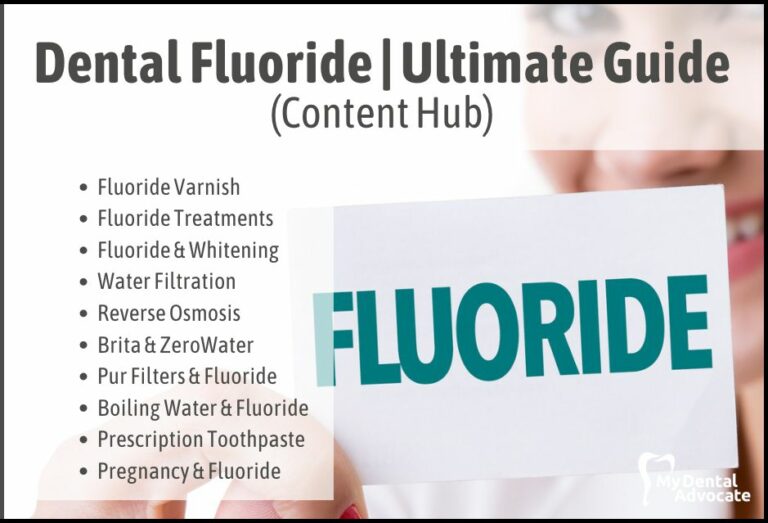
Dental Fluoride | The Ultimate Guide (Content Hub)
As a dental professional, I understand the importance of maintaining good oral health and preventing dental problems. Fluoride is an effective tool in promoting dental health and preventing cavities, but there are potential risks…

How to Read a Dental X-Ray (Dentist Tips)
Reading dental X-rays is crucial for dental professionals, offering insights into hidden oral health issues. Mastering this skill involves understanding the anatomy displayed in different X-rays—like bitewings, periapicals, and panoramics.

5 Best Mouthwash for Gingivitis 2024 (My Thoughts)
Gingivitis, though common, can be a thorn in the mouth that no one should ignore. As the first stage of gum disease, it’s critical to address this condition with the proper oral care regimen to prevent it from escalating to more severe dental issues.
Gain Clarity with Our FREE Second Opinion Guide
Receive clear, expert second opinions online within 48 hours. Start today!
Product Reviews
Our 250+ dental product reviews (and counting), curated by an experienced dentist, are the most comprehensive online.
Toothbrush Genie
State-of-the-art chatbot designed to help you discover your perfect toothbrush in just a few simple steps!
Cavity Risk Assessment
Cutting-edge digital tool designed to evaluate your individual cavity risk based on your responses to a series of questions.
Gum Disease Assessment
Discover your gum disease risk with our quick and engaging 6-question assessment!


